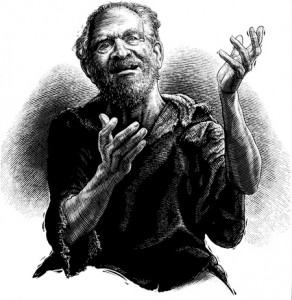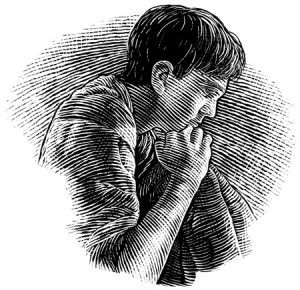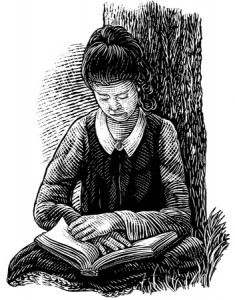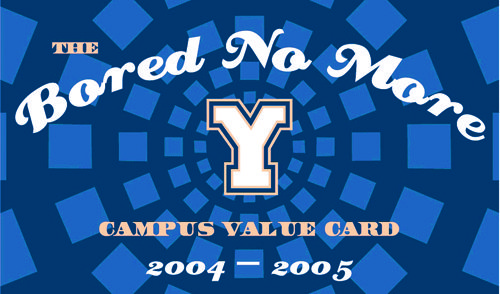The face of need—encountered in a busy city street, a quiet church building, or a familiar home—cries out for mercy and reminds us that we are all beggars.

I have only a simple message for you today, a story about a young woman I watched grow up in a small ward of The Church of Jesus Christ of Latter-day Saints in rural Pennsylvania. Her father worked for much of his life in one of the few coal mines still operating and was a counselor in the bishopric; her mother served in the Relief Society. At age 12 this young woman had those eager, faithful eyes you can see in young Beehives almost anywhere. I have her image fixed in my memory of a stake youth handcart trek when she was 14, reading the scriptures in solitude on a brisk early morning. By the time she was 17, we didn’t see her much, and at 18 she went away to college, where she struggled with the criticism of her beliefs she heard there. I haven’t seen her in the last half-dozen years. As I proceed, you might not recognize right away that she is, in fact, the subject of this story, so I thought it a good idea to tell you what I’m doing in advance. I’ll call her Erika, though that’s not her real name.
On His way from Jericho to Jerusalem, where He would share His last Passover meal, Jesus was stopped by a blind man at the side of the road, a beggar.
As he went out of Jericho with his disciples and a great number of people, blind Bartimaeus, the son of Timaeus, sat by the highway side begging.
And when he heard that it was Jesus of Nazareth, he began to cry out, and say, Jesus, thou Son of David, have mercy on me. [Mark 10:46–47]
Our family has been thinking quite a lot about the blind lately, since Evan, our 15-year-old, has taken it in hand to give a home to a puppy from one of the two national seeing-eye dog foundations. His sponsor and owner, Guide Dogs for the Blind, gives all the puppies from a single litter names beginning with the same letter. They’d gotten around to the letter B, so our dog’s name is Bernie.
Our job is to teach Bernie simple commands, to familiarize him with the conditions and situations he’ll likely face later on as a working dog, and to attend training classes together with him. He’ll go to Orem High School this fall with our son, in his uniform (the dog, I mean) and hopefully on his best behavior (both of them). When he’s about a year and a half old, he’ll go away to guide-dog school in California, where he’ll work alongside his new owner, who will be blind. If Bernie gets that far, our purpose in raising him will have been met, and some of the pain of losing him will be tempered with the good he’ll do for his new owner.
Bartimaeus was blind and a beggar when he called to Jesus, who was traveling on his way from Jericho to Jerusalem.
When he heard that it was Jesus of Nazareth, he began to cry out, and say, Jesus, thou Son of David, have mercy on me.
And many charged him that he should hold his peace: but he cried the more a great deal, Thou Son of David, have mercy on me. [Mark 10:47–48]
In all the places my wife and I have traveled since our days at BYU, I’ve struggled with what it means to have mercy for beggars. I’ve certainly seen real need from time to time, the face of poverty and want, but I’ve been troubled mostly, I suppose, because sometimes I’m too much an amateur to tell the genuine from the professional—real need from opportunism or even thievery—and I doubt whether I even know what a beggar ought to be.

Years ago, while a student in Manhattan, I tried giving an apple to someone I saw every day on the street asking for money; I figured if he was hungry, like he said he was, he would want what I offered him. He didn’t, and he followed me for a while down the street to let me know what he thought of me. A friend of mine was walking with a lawyer near that same spot when an apparently crippled woman in a wheelchair blocked their path and held up a bent tin cup. My friend reached for his pocket—while the lawyer reached for the cup, which he crushed and threw with disgust into the gutter. He jerked the rusted wheelchair around and announced that they were off for the nearest police station. My friend froze at his audacity—that is until the woman leapt out of the wheelchair and escaped at a dead run down a side street. The lawyer had recognized her, having prosecuted her in court for fraud.
What are the differences among the beggars I’ve met in my life? In uptown Manhattan near one of the music conservatories, I often passed a young man who played his violin on the sidewalk, his open instrument case usually stuffed with cash. His feigned artistic idealism appealed to the yuppie crowds, who blindly financed his chauffeured limousine. On the other hand, what of the young, filthy woman with an outstretched hand I passed in Milan, Italy, sheltering an obviously sick child in a rancid quilt, the two of them huddled tightly together against the cold? I remembered at the time the advice of a relative living in Mexico City, who warned me of beggars with rented children, preying on the pity of rich American tourists. If a person was truly in need, how was I to know?
I’ve spent some time working in Naples, Italy, sequestered in dusty archives, pouring through old manuscripts and books as part of my research as a historical musicologist. The old Italian music I study is strange to the city now and seldom heard. When the libraries close, early and often, I’m back on the streets, sometimes in sections of Naples that are very poor, with beggars everywhere.
In the summer of 1987 a young boy there asked me for money in a subway station, and I ineptly shook my head and glanced away. At first I blamed my poor Neapolitan dialect for not understanding him (except for his open hand), but when others also looked puzzled, I realized that he too was foreign. I watched him go as he walked the length of the station.
It was always the same. He took a few slow steps, bent his right arm at the elbow, and rested it on his bony hip, his left hand behind his back reaching through to grab his upper-right arm. His right hand was cupped near to his body and almost closed, weakly drifting back and forth. He shifted all his thin weight to his left leg, turned his other foot to its outside edge, and bent his back in a slow arch. He never looked those he confronted in the face; his gaze went past you, about chin height. He repeated the same incomprehensible words over and over, and after each rejection he scuffed his feet, shuffled a bit sideways, and moved on, first to this group, and then that—a businessman, a mother, some imitation punk rockers, a factory worker, a man in uniform. He went to each person in the crowded station, a captive audience for his pitiful performance, and no one gave him anything. A few laughed. The teenagers mocked him. Most just ignored him.
As I watched the scene unfold, I thought, “He’s about the same age as my own 11-year-old son, about the same height, same hair color, same complexion, same awkward, uncomfortable posture that all 11-year-old boys have.” Then suddenly, as I stood in that crowded Neapolitan mélange of humanity, I saw my son in his face as he stumbled into the press around me. I panicked and wanted desperately to go after him. But my train arrived, and I got on, maneuvering myself next to the window to search for him. I saw him standing there, alone in the deserted station, and then he was gone.
Previously, in Milan, I had reversed my steps and sought out that woman huddled in a blanket with her child and had given her a few dollars in lire, but only after I had walked on several blocks and then turned back, ignoring stories about rented children. She saw me approaching, and with a troubled, uncertain heart, I hesitantly said, “This is for you and your child.” She looked surprised but grateful, and I remember wondering whether my caution was foolish. This time, in Naples, I couldn’t go back.
The face of that young boy in a subway station will be one of those images that will never leave me. Like the face of my young brother, years ago, as I led him into a hospital room to say goodbye to our father, or the face of my firstborn child, the face of that young beggar was the face of need. I’ve thought a good deal about beggars since then. The young boy had no money, and I had no will to help him. Which of us was the beggar? “For behold, are we not all beggars?” was the question posed by King Benjamin (Mosiah 4:19).
When blind Bartimaeus, at the roadside, heard it was the Christ passing by, he could not be silenced,
but he cried the more a great deal, Thou Son of David, have mercy on me.
And Jesus stood still, and commanded him to be called. And they call the blind man, saying unto him, Be of good comfort, rise; he calleth thee.
And he, casting away his garment, rose, and came to Jesus.
And Jesus answered and said unto him, What wilt thou that I should do unto thee? [Mark 10:48–51]
Throughout my life I’ve wondered when I would next see that boy’s face—the face of need—and, even more, what I would do when he approached me once again. What will he ask of me this time, and what will I offer? I’ve often thought of how Christ responded to Bartimaeus: “What wilt thou that I should do unto thee?” For each time I see that boy’s face now, I think, “What can I do?” and these days he, like Bartimaeus, almost never asks for money.
I saw his face again about 10 years later. This time he was an old man, excommunicated from the Church for nearly 20 years. In his youth, Paul had been a stalwart Saint and a civic leader. He helped build the local LDS chapel with his own hands and served in it as bishop for 10 years. Later he deliberately stepped off the path, let go of the rod, and closed his eyes. He was blind, by his own account. It was as Isaiah chided, “We grope for the wall like the blind, and we grope as if we had no eyes: we stumble at noonday as in the night” (Isa. 59:10).
I first heard of Paul from one of his close friends, a man who had also left the Church, but who had been loved and taught and had reached decisions that were bringing him back home. He told me that Paul had promised to come when he was rebaptized. When the day arrived, it was easy to pick out Paul as he slipped surreptitiously into the back of the room. He was neat and well groomed, acted with great reverence, and tried to be as inconspicuous and anonymous as possible. He sat right at the side, just inside the door, with his eyes fixed on the floor, his hands twisted together in his lap.
As the service progressed and the baptism was performed, with everyone’s attention fixed on that sacred ordinance, I stole a quick glance at Paul and was astonished to recognize him now so clearly. It was the same face I remembered, the same yearning and helplessness I had seen before, imprinted on my mind by a young boy in a crowded crush of uncaring humanity in Naples. Paul didn’t speak as he watched his friend go down into the water, but I’ve never heard a plea for mercy more clearly. I remember thinking as I looked at Paul, What can I do?
[Bartimaeus] cried the more a great deal, Thou Son of David, have mercy on me.
And Jesus stood still, and commanded him to be called. And they call the blind man, saying unto him, Be of good comfort, rise; he calleth thee.
And he, casting away his garment, rose, and came to Jesus.
And Jesus answered and said unto him, What wilt thou that I should do unto thee? The blind man said unto him, Lord, that I might receive my sight. [Mark 10:48–51]
The service ended, and Paul was out the door, sprinting for the exit. Could I once again watch him move off into the distance? I found myself bolting down the hallway behind him, calling his name. And he stopped to talk. Over the next year we became friends, and later, surrounded by friends new and old and armed with a remembered testimony, he himself was rebaptized in a small, quiet ceremony in that same room. Today he travels three hours each way to the temple once a week, wondering how he could have been blind for so long, struggling to find the words to thank his Heavenly Father for allowing him to see once again.
The meaning of King Benjamin’s sermon was never more plain to me.
For behold, are we not all beggars? Do we not all depend upon the same Being, even God, for all the substance which we have, for both food and raiment, and for gold, and for silver, and for all the riches which we have of every kind?
And behold, even at this time, ye have been calling on his name, and begging for a remission of your sins. And has he suffered that ye have begged in vain? Nay; he has poured out his Spirit upon you, and has caused that your hearts should be filled with joy, and has caused that your mouths should be stopped that ye could not find utterance, so exceedingly great was your joy. [Mosiah 4:19–20]
Who, then, was that blind beggar Christ met on the road but each of us, blind and begging in our own ways, crippled by emotions, pride, tragedy, a fainting heart, doubt, or sin. At times we seem surrounded by darkness. It can be so difficult to see the tree, the path, and the iron rod. As Nephi warned us, “The mists of darkness are the temptations of the devil, which blindeth the eyes, and hardeneth the hearts of the children of men, and leadeth them away into broad roads, that they perish and are lost” (1 Ne. 12:17). There to one side you might come across a young girl without hope or a young man confused by the iridescent reality of a hectic modern world. There are people all around us, in our classes in school, in our workplaces, in our homes and families, who cry, like Bartimaeus, “Have mercy on me.” And we, in turn, reflect on the Savior’s answer to Bartimaeus:
What wilt thou that I should do unto thee? The blind man said unto him, Lord, that I might receive my sight.
And Jesus said unto him, Go thy way; thy faith hath made thee whole. And immediately he received his sight, and followed Jesus in the way. [Mark 10:51–52]
I told you earlier that my story was about Erika, the young girl from a humble family in central Pennsylvania. I first met her in the autumn of 1991, when the scenery in Appalachia takes your breath away. Our stake was mostly rural, with a small LDS population of less than 2,000, although it was large in geography, spread out over an area about the size and shape of New Jersey. I grew to love its obscure back roads, where directions are given by landmarks, churches, and John Deere dealerships, rather than street signs, and I almost looked forward to the hours of driving, particularly in the comfortable, brilliant coloring of fall. The land is wrinkled with rolling hills, smothered in trees, and filled with acre after acre of corn, abandoned coal mines, the Amish, warmhearted neighbors, and a sense of home that rooted one branch president to the very neighborhood settled by five of his ancestors who fought in the American Revolution.
It was in such a place, in a small ward of about 80 active members, that I met Erika at a ward conference. She was one of a group of 15 young women and one young man, seated in a circle during Sunday School. One of the ward leaders was addressing the youth, and as I looked around the room into their faces, I found 12-year-old Erika, who looked back at me with a face of simple trust, innocence, and faith. I looked from each youth to the next, one at a time, thinking, What can I do? And then over the next eight years, I watched Erika grow from a radiant Beehive to a searching 14-year-old in a pioneer dress, weeping all alone as she wrapped herself in her scriptures outside a handcart camp on a damp summer’s morning, to a struggling young adult on her way to college.

There’s much more, of course, to Erika’s personal story—of what I and others did to reach out to her as she grew older—but in many ways I’ve told you what I believe are the most important things I know about her. Actually, her name and the particulars of her story don’t really matter. She could have any name. She could be anywhere. She is out there, somewhere, although for you her name might be Mindy or Emily. You’ll recognize her because you’ve seen her face before, just as I have. For me it’s the face of an 11-year-old beggar I found in a Neapolitan subway. You may find someday, as I did, that she has a face that somehow looks like the face of your own child. You will find her along the side of the road on the journey you are now beginning, huddled with her child against the cold or trying to slip out unnoticed from a church meeting or even eagerly gazing at you in innocence in a Sunday School class; and in some way or another you’ll recognize the child asking for mercy whom I know so well. You’ll see the eyes I saw in an innocent youth and in a wounded old man.
You’ll know when you see them that, if you have the will, you might walk just a bit in front, or better yet, by their side—not in a uniform or on a leash as our guide-dog Bernie will do someday, but like Bernie you can be someone else’s eyes for just a little while. You yourself may, at some point, need to lean on someone else’s arm just a bit, trusting in their sight, which may for the moment be just a little clearer than your own, relying on someone who can help you find your way back home. For we are all beggars.
When the Savior met Bartimaeus, He had begun His final journey from Jericho to Jerusalem, where He would make the greatest sacrifice of all time. The New Testament account of their meeting, in Mark chapter 10, is directly preceded by these verses, in which the Savior, the greatest example of all, taught us the true purpose of His life and mission:
Whosoever will be great among you, shall be your minister:
And whosoever of you will be the chiefest, shall be servant of all.
For even the Son of man came not to be ministered unto, but to minister, and to give his life a ransom for many. [Mark 10:43–45]
Wherever our roads lead each of us, beginning from here at this moment, whether to rural Pennsylvania, Naples, BYU, or back to your own hometown, you and I must find Erika, the face of need, and fulfill Isaiah’s prophecy that “the eyes of the blind shall see out of obscurity, and out of darkness” (Isa. 29:18), that we can say, as Job, “I was eyes to the blind, and feet was I to the lame” (Job 29:15).
It is my hope and prayer that you will go find Erika, wherever she is, and help her to see again.
Dale E. Monson, director of BYU’s School of Music, gave this devotional address July 20, 2004.
FEEDBACK: Send comments on this article to magazine@byu.edu.









